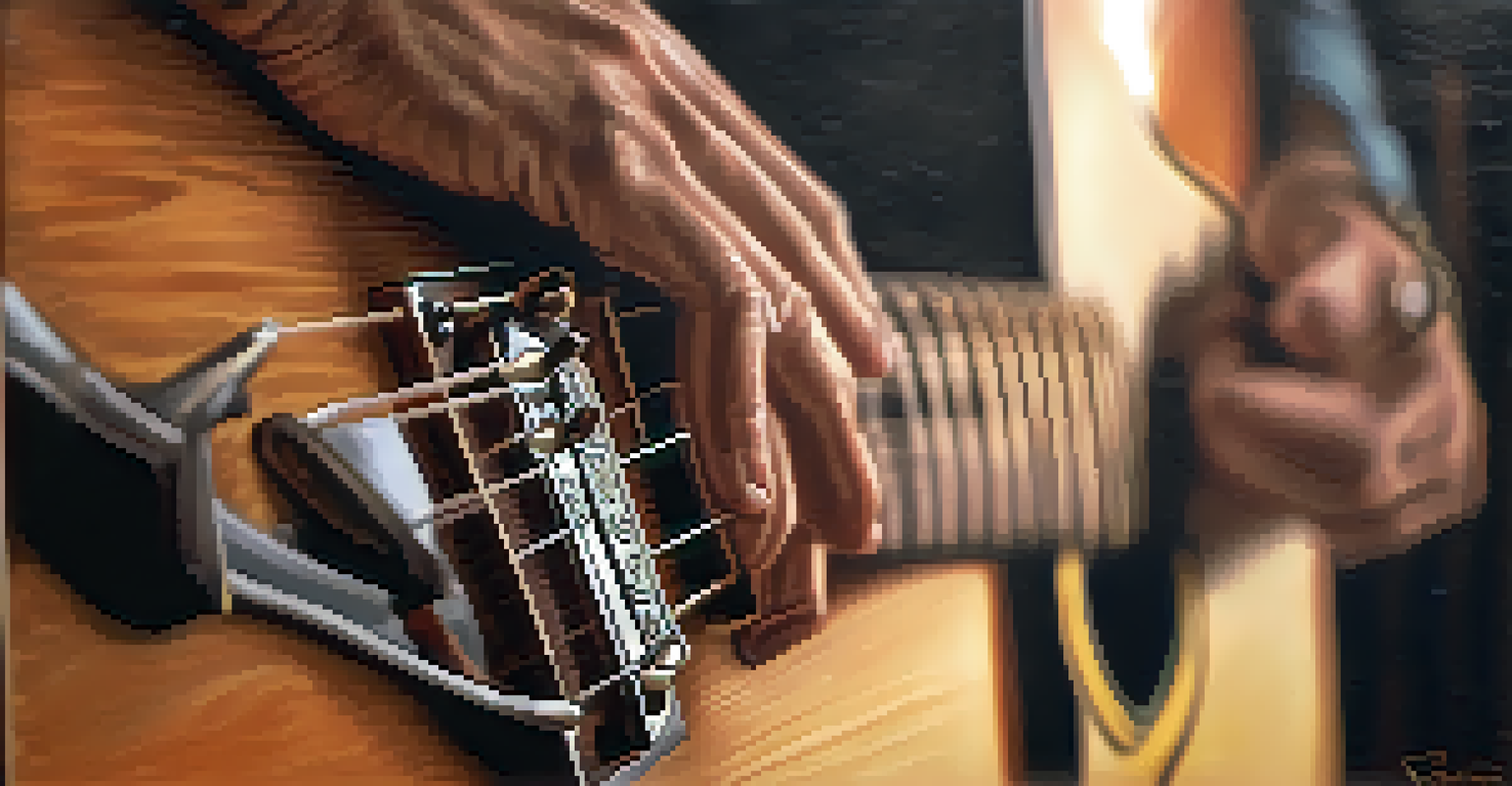The Emotional Spectrum: Using Guitar to Express Your Feelings

Understanding the Emotional Connection to Music
Music has an incredible ability to resonate with our feelings, serving as a universal language. When we listen to a song that speaks to us, it can evoke memories, trigger tears, or even bring a smile. This emotional connection is not just limited to listening; playing an instrument, like the guitar, allows us to express our feelings directly.
Music can change the world because it can change people.
Just like painting or writing, playing the guitar is a form of self-expression. Each strum or chord can represent a different emotion, creating a personal soundtrack to our lives. Whether you’re feeling joy, sadness, or anger, the guitar becomes an outlet for those feelings, helping you process them in a healthy way.
Imagine strumming a few chords in a quiet room when you're feeling down. The sound can transform your mood, making you feel less isolated. By embracing the emotional connection to music, we can better understand ourselves and communicate our feelings to others.
The Power of Chords: Emotions Behind Each Sound
Different chords evoke different emotions. For instance, a major chord often conveys happiness and brightness, while a minor chord can express sadness or longing. This basic understanding can help you choose the right chord progression to match or alter your mood.

Consider a simple song like 'Let It Be' by The Beatles. Its uplifting major chords create a sense of hope and reassurance. On the other hand, songs like 'Tears in Heaven' by Eric Clapton use minor chords to convey deeper feelings of loss and yearning, illustrating how chord choices shape emotional narratives.
Music as Emotional Expression
Music allows individuals to express and process their emotions, whether through playing instruments or songwriting.
By experimenting with various chords, you can create your own emotional palette. With practice, you'll find that certain combinations resonate with your feelings, allowing you to articulate emotions that words may fail to express.
Melody: The Voice of Your Emotions
While chords provide the foundation, melody is where your emotions truly come alive. A soaring melody can encapsulate joy, while a descending line might capture sorrow. Crafting a melody that echoes your feelings can be a powerful way to communicate what you’re experiencing inside.
The beautiful thing about music is that it transcends language.
Think of the melodies in iconic songs—each note telling a story or conveying a feeling. When you play a melody on the guitar, it’s like giving a voice to your innermost thoughts and emotions. This connection between melody and emotion can be deeply cathartic, helping you process complex feelings.
As you experiment with melodies, pay attention to how they make you feel. You might find that certain notes resonate with specific emotions, guiding you to create music that feels authentic and true to your experiences.
Lyrics: Telling Your Story Through Music
Lyrics can serve as a powerful tool for emotional expression, allowing you to articulate feelings that might otherwise remain unspoken. Writing your own lyrics gives you the freedom to explore your thoughts and experiences, crafting a narrative that reflects your journey.
For example, think about the catharsis of writing a song about a breakup. The process of putting your feelings into words can be incredibly therapeutic, transforming pain into art. This not only helps you heal but also allows others to connect with your experiences through shared emotions.
The Impact of Chords and Melody
Different chords and melodies evoke specific emotions, enabling musicians to articulate feelings beyond words.
When you combine lyrics with your guitar playing, you create a rich tapestry of sound and meaning. This combination can be deeply impactful, resonating with listeners who may have felt the same way, fostering a sense of community and understanding.
Improvisation: Spontaneous Emotional Expression
Improvisation on the guitar can offer a unique way to express your emotions in real-time. Without the constraints of written music, you can let your feelings guide your playing, resulting in a raw and authentic musical experience. This spontaneity can be liberating, allowing you to explore emotions as they arise.
Imagine picking up your guitar after a long day and just letting your fingers move freely. The notes you play may reflect your frustration, joy, or even a sense of peace. This unfiltered expression can help you process your feelings, creating a personal musical diary that captures your emotional state.
As you become more comfortable with improvisation, you’ll find it easier to tap into your emotions and express them through your playing. This practice not only enhances your musical skills but also deepens your emotional connection to the guitar.
The Role of Practice in Emotional Expression
While the emotional aspects of playing guitar are vital, practice is equally important in expressing those feelings effectively. The more you practice, the more comfortable you become with your instrument, allowing you to focus on conveying emotions rather than struggling with technique.
Consider the difference between a novice player and a seasoned guitarist. The latter can easily navigate their instrument, pouring their heart into each note, while the former may feel restricted by their limitations. Regular practice not only improves your skills but also builds confidence to express your emotions freely.
Sharing Music Builds Connections
Sharing your music fosters connections with others, creating empathy and a sense of community through shared emotional experiences.
By dedicating time to practice, you create a space where your emotions can flow through your music. This commitment helps you develop a unique style that reflects your personality and emotional landscape, making your playing more authentic and relatable.
Sharing Your Music: Connecting with Others
Once you've developed your emotional expression through guitar, sharing your music can deepen your connection with others. Whether it’s playing for friends, family, or even a larger audience, sharing your work invites others into your emotional journey. This act of vulnerability can foster empathy and understanding.
Think about the power of a live performance. When a guitarist plays a heartfelt song, the audience often feels a shared emotional experience. This connection can create a sense of community, as listeners resonate with the emotions conveyed through the music.

Don't underestimate the impact of sharing your music through social media or local gigs. Every time you share your guitar playing, you open the door for others to relate to your feelings, creating a beautiful cycle of emotional exchange that enriches both you and your audience.